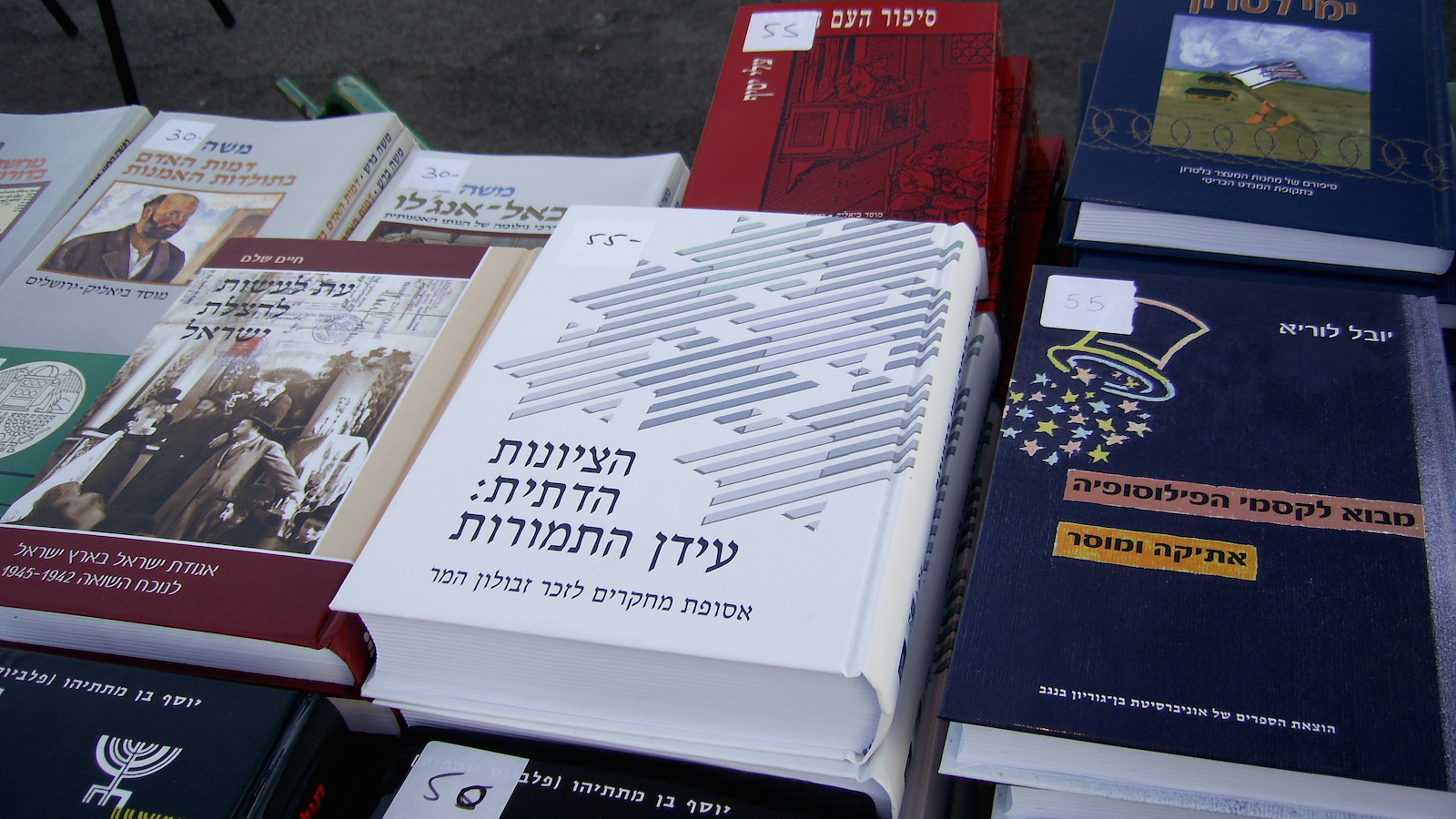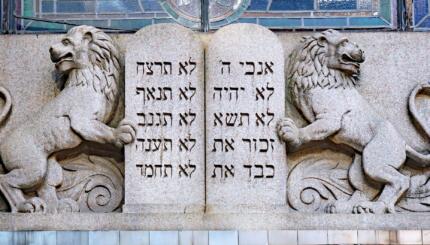As it gradually became possible during the later 18th century for Jews in Western Europe to leave the walled‑off life of the ghetto and enter into modern European society, some Jewish intellectuals, associated with the merchant and managerial classes, adopted Hebrew as the means of creating a new kind of Jewish culture that might take its place with the cultures of other peoples in a progressive international society of enlightened men. (The progressive cosmopolitanism of the European Enlightenment touched these Jews deeply.)
READ: Enlightenment, Emancipation and Haskalah
In their eyes, Yiddish could not serve this purpose because it was a low “jargon,” associated with their remembrances of the ghetto — and, one might add, linked with their own self‑rejection. To adopt German exclusively, on the other hand, would have meant the renunciation of Jewish cultural distinctiveness — of all the historical memories, associations, and emphases of feeling, that a people stores in its own language. When an 18th-century German Jew, then, decided to write a poem on spring, an essay on educational reform, a satirical sketch, in Hebrew rather than in his native Yiddish or his acquired German, he was strenuously affirming a new relationship as a Jew both to modern culture and to the Jewish past, and through this he was proposing a model for others.
The Hebrew term itself chosen for “Enlightenment,” Haskalah, suggests both a state of being and an active causative effect on others. A maskil, or proponent of Haskalah, is, according to grammatical context, a person who understands or one who induces understanding in others. This early sense of national purpose, it should be noted, and this effort of cultural self‑definition, continue in radically transformed ways to play an important role in Hebrew writing down to many Israeli contemporaries.
With your help, My Jewish Learning can provide endless opportunities for learning, connection and discovery.
Wherever assimilation became widespread, Hebrew literature quickly disappeared, for the obvious reason that with assimilation the audience of readers who knew Hebrew through the traditional Jewish educational system rapidly dwindled, then vanished. Ha-Measef, the first journal of the Haskalah, founded in Koenigsberg, Prussia, as a monthly in 1783, declined into an annual in the 1790s and by 1797 it had only 120 subscribers. By the 1830s, the main center of Hebrew literary activity had moved eastward from Germany to Galicia (the eastern end of the old Austro‑Hungarian Empire), where the Jewish population was more concentrated and traditional life stronger. A generation or two later, though significant Hebrew writing continued in Galicia, the most important centers had moved still further eastward to Poland and Russia.
This new Hebrew literature was by no means a mass movement. Typically, it would focus in some large town — Vienna, Lemberg, Warsaw, Vilna, Odessa — where emancipated Hebrew intellectuals (in general, former yeshiva students, self‑made refugees from the small Jewish villages) would gather to put out a Hebrew newspaper or literary magazine and spread the good word of “Enlightenment” to their fellow Jews.
Ha‑Measef gasped its last breath in 1829 after years of intermittent publication. Meanwhile, a new Hebrew periodical had been launched in Vienna, Bikkurei Ha‑Ittim (1820‑1831), to be followed there in the next generation by Kerem Hemed (1833‑1856). The two Galician journals tended to have more of a scholarly‑historical emphasis than did Ha‑Measef, but the general effect of a didactic miscellany was never lost, even as a whole series of more sophisticated periodicals in the course of time were established in the cities under tsarist rule where there were Jewish centers, culminating in Ha-Shiloah of Odessa in the late 19th and early 20th centuries.
These publications at best would have a circulation of a few thousand, sometimes of no more than a few hundred, and since the Orthodox community vehemently opposed the new secular writing, the journals were often read secretly in the provinces as a kind of underground literature. One must add that most of what was written during the Hebrew Enlightenment was characterized far more by earnestness than by originality or accomplished literary art. The poetry often seems composed mainly to prove that it is possible to write poems in Hebrew, or to demonstrate that there is something intrinsically poetic or “sublime” in the language of the Hebrew of the Bible. Altogether, a sterile infatuation with the Hebrew language in and of itself plagues Haskalah writing to the end. The essays, generally directed to topical questions concerning Jewish education and culture and the reform of Jewish society, are more of historical than of literary interest. The fiction, often a satirical exposure of the oppressiveness or rigidity of the old rabbinic authorities, is generally awkward in style and narrative method, and primitive in characterization.
Nevertheless, the literature survived, continuing to inspire loyalty in its readers and to have enormous personal meaning for them, perhaps because of the sheer fact, that whatever its faults, it was, after all, a developing modern literature in Hebrew. There were a few instances of interesting individual talent through the middle years of the nineteenth century, but Hebrew literature attained real maturity only after the Haskalah period, which Hebrew literary historians conventionally end around 1881.
There was, for reasons that are not hard to imagine, a curious time lag in the mental world of the Haskalah. Its proponents still cherished the values of Frederick the Great, Voltaire, and Lessing at a point when cosmopolitanism and calm reason were forgotten dreams in European history and a fiercely assertive new nationalism was making itself felt everywhere. A full generation after the main wave of European Romanticism, some Haskalah writers do begin to produce idylls and to celebrate, decorously, the passionate aspects of life, but the more powerful themes–both in a literary and a political sense–of European Romanticism (like the engagement with the irrational and the occult, and the affirmation of organic national community) remain quite beyond the maskilim.
It took some historical shock waves impacting directly on European Jewry to change this whole orientation. By 1881 anti‑Semitism in the West was established as a supposedly scientific doctrine and was already being translated into official edicts of restriction and banishment in Bismarck’s new Germany. Shalom Yakov Abramowitz’s story, “Shem and Japheth on the Train,” vividly reflects this situation. In 1881, Alexander II was assassinated; the succession to the throne of Alexander III led to a new order of repressive reaction in Russia, with Jews among the principal victims. Jews were forced out of the smaller towns in the Pale of Settlement; with transparent government collusion, they were exposed to waves of murderous pogroms. “A third will die,” as Pobedonostsev, one of Alexander’s most infamous ministers, grimly put it, “a third will convert, and a third will leave.”
In these harsh circumstances, the cosmopolitan assumptions of the Haskalah were obviously no longer tenable, and they were replaced by a new quest for connection with the Jewish people by Hebrew writers. For some, this took the form of an incipient political nationalism, a sort of proto‑Zionism. (Zionism as a political movement did not begin until the very last years of the century.) For some, it meant a return to the folk, an interest in its ways and traditions, a sympathy for its plight which did not, however, exclude satire. Now, this bond with the people, which some Hebrew literary historians regard as a form of late Romanticism, was obviously no guarantee of artistic quality; but at least writers were freed from the internal contradiction of the Haskalah, where men of literary bent wrote in the classical language of a people from whom they were often profoundly alienated, a people many of them were seeking, perhaps unwittingly, to transcend.
Reprinted with permission from Modern Hebrew Literature, published by Behrman House.



